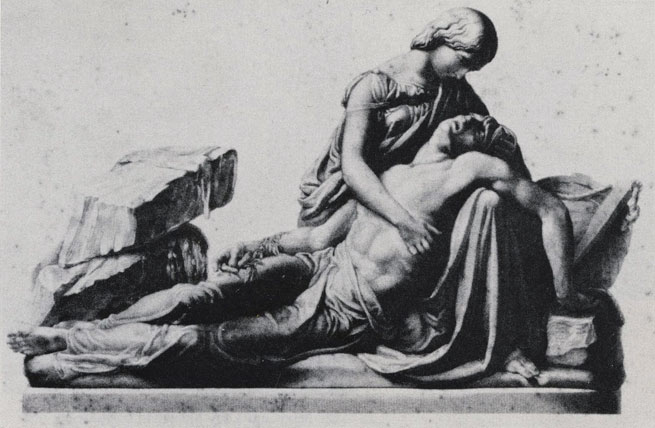Imagine discovering a new set of string quartets by Beethoven or a large canvas by Turner that was thought to be lost. In either case, the mainstream media would have been agog, just as they were for the discovery of an original Shakespeare folio in April 2016.
So it’s remarkable that the release to public view of a major work by a near contemporary of both these artists on November 10 2015—the poet Percy Bysshe Shelley—was met with an air of such disinterest (The Guardian newspaper excepted).

There were brief mentions and some excerpts were read out on BBC Radio 4, but no welcoming comments appeared from government ministers including the UK’s Minister for Culture, Media and Sport. So much for a significant early piece by one of Britain’s most revered poets.
The work in question was a pamphlet by Shelley entitled the “Poetical Essay on the Existing State of Things,” written anonymously in 1811 in support of Irish journalist Peter Finnerty who was imprisoned for libel after criticising the British military command during the Napoleonic Wars. Although a thousand copies of the pamphlet were printed, it is not known how successful the poem turned out to be in terms of raising money; what’s clear is that the work disappeared from view.
During the 1870s, some expert detective work positively identified a surviving example of the poem as the work of Shelley. Much more recently in 2006, a single copy was re-discovered by the scholar H.R.Woudhuysen, but it was lodged in a private collection so the work remained hidden from public view.
That was the position until 2015, when this private copy was acquired by the Bodleian Library in Oxford. You can now read (and even download) a copy from the Bodleian Library website. Poet and ex-children’s Laureate Michael Rosenhad been campaigning for the release of the work for some time previously. In a blog post he gave his thoughts about why, in his words, the poem had been ‘suppressed,’ and why he had campaigned to get it released to the public.
Rosen argues that confusing the artistic substance of the pamphlet with the ownership of the physical artifact had meant that only a few privileged people could access the full content—a scandalous situation in his view.
What about the pamphlet itself? The Poetical Essay consists of a prose introduction along with a 172 line poem followed by accompanying notes. The nature of the work is clear: it’s a reasoned and passionate response to the perceived ills and injustices of the world by an 18 year old radical.
First and foremost the young Shelley issues a pointed condemnation of the militaristic stance of the British establishment, along with stanzas that are vehemently anti-monarchist and implacably opposed to the abuses of wealth that were prevalent at the time:
“Man must assert his native rights, must say;
We take from Monarchs’ hand the granted sway;”
The range and scope of his criticism is impressive, including a keen censure of the role of the media. Going way beyond simple anti-monarchism, the introduction to the poem reveals a subtle understanding of the kind of secular republican society that Shelley desires. For example, he states that:
“This reform must not be the work of immature assertions of that liberty, which, as affairs now stand, no one can claim without attaining over others an undue, invidious superiority, benefiting in consequence self instead of society.”
In this passage he correctly identifies the problem of equating liberty with an unrestrained personal freedom—what the philosopher Isaiah Berlin labeled as “positive liberty” in the 1950s. This remains a central concern of republicanism today. Likewise he warns clearly about the dangers of violent revolution in advancing the cause of egalitarianism:
“…it must not be the partial warfare of physical strength, which would induce the very evils which the tendency of the following Essay is calculated to eradicate; but gradual, yet decided intellectual exertions must diffuse light, as human eyes are rendered capable of bearing it.”
Interestingly, Shelley uses the words “patriot” and “patriotism” three times in the body of the poem. On each occasion he makes it clear that the duty of a patriot is to attempt to shine a light on the corruption and secrecy that surrounds autocratic government. For example:
“And shall no patriot tear the veil away
Which hides these vices from the face of day?”
But this range of criticism is, ironically, also a source of weakness in the work. As John Mullen pointed out in The Guardian, Shelley’s targets are hidden behind abstractions. The poem doesn’t deliver the punch of some of his later works such as the sonnet “England in 1819”, and the poem “Masque of Anarchy,” where the focus is on a single event—the outrage of the 1819 Peterloo Massacre. Interestingly, both of these works were also suppressed until the 1830s.
Was the public’s 200 year long wait for the poem worthwhile? For me the answer is ‘yes’, once I had become accustomed to the language and phrasing that Shelley uses. As Rosen says in this article by Alison Flood:
“…the poem was full of ‘portable triggers, lines of political outrage for people to catch and hold’. He added: ‘Political writing is often like that, but in times of oppression and struggle, this is no bad thing: a portable phrase to carry with us may help.’”
Ultimately, the concealment of Shelley’s Poetical Essay highlights a number of important contemporary issues about the values of our own society, including the rights of possession and access to important cultural artefacts.
Undoubtedly, the pamphlet contains explosive ideas which the British establishment might continue to regard as dangerous. It would be crass and superficial not to acknowledge that the situation in which Shelley found himself in 1811 is very different from the one we inhabit in the second decade of the 21st Century. Yet in some respects the poet would be depressed to see how certain aspects of social and political life have barely changed.
First, the poem was written to help raise money for a journalist—Finnerty—who was critical of Britain’s military commanders and who was imprisoned for libel as a result. With the increasing focus on military issues in Iraq, Afghanistan, Syria and elsewhere can we be sure that important criticisms of the military are not being similarly gagged today? Note how the failures of the British Army in Helmand Province, Afghanistan, for example, have been suppressed, including those highlighted by servicemen who were directly involved. News continues to be managed and the opinions of pacifist ex-servicemen are still marginalised.
Second, a central concern of Shelly and other critics in 1811 was the way in which the poor were made to bear the costs of military activity, while the glory and spoils of war were garnered by the establishment. What would his poem say if it were to be written today about the commitment of the UK government to spend two per cent of GDP on the military, or to give tax cuts to the wealthy, or to protect trusts and tax havens while cutting disability benefits, some of which affect ex-servicemen?
Finally, Shelley’s concern with the methods by which society can be moved from a position where privilege holds power to one where power is distributed throughout society and held accountable is just as real today. But here he runs into the same problems as everyone else who is seeking radical change.
Shelley claimed that the actions he was proposing in his pamphlet did not infringe on the interests of Government, but this was surely naive. Taking power from those who possess it is itself a revolutionary act. He needed to have looked no further than recent history (for him) in the form of the American Revolution for confirmation of this fact.
As Shelley put it in his poem:
“Then will oppression’s iron influence show; The great man’s comfort as the poor man’s woe.”
How to achieve peaceful and lasting change in modern societies remains an unanswered question, and one that’s ripe for fresh action and inspiration. Dangerous ideas from poets are just what a genuinely open society should be able to encompass and discuss, not conceal, ignore or suppress.
This article was originally published by OpenDemocracy under a CC-BY-NC licence


Rate and Review
Rate this article
Review this article
Log into OpenLearn to leave reviews and join in the conversation.
Article reviews